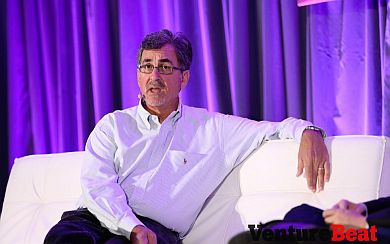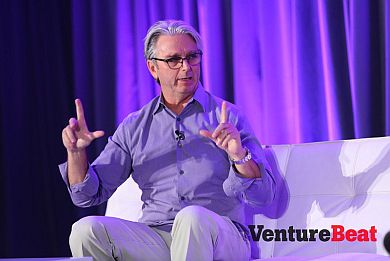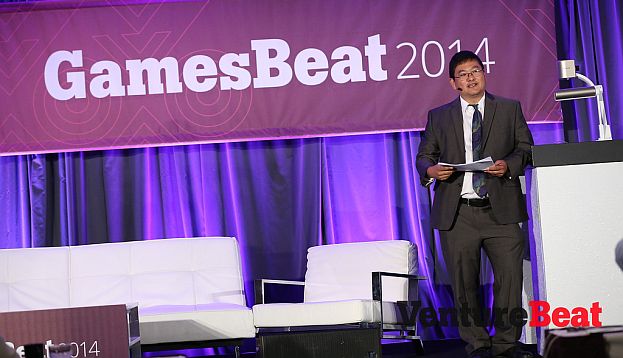The GamesBeat 2015 conference in San Francisco last week was an all-star event, with plenty of interesting speakers providing information, insights and opinions about the current state of the game industry and where it’s headed. While Dean Takahashi of VentureBeat said the theme of the conference was Total World Domination, most speakers seemed to set their sights a little lower — though perhaps not by much.
David Helgason, CEO of Unity, was asked how long Supercell could sustain Clash of Clans as the #1 app in the App Store. “As a friend of all these people I wish them luck,” Helgason said, half-joking, “As an industry person I hope they drop out like a fly. It’s better if things mix up a bit.” Helgason went on to explain that’s he’s hoping for more variation in the top ten list, not that he wanted to see his friends at Supercell fall on hard times.
Michael Pachter was interviewed by Geoff Keighley, in a last-minute substitution for Peter Molyneux who was unable to make it out from England for the show. When asked about the Mojang acquisition by Microsoft, Pachter said “If you have a company for sale, it’s a good time to be you.” Pachter’s not surprised by the deal, given that Minecraft has been downloaded over 100 million times. “It generates a tremendous amount of interest and eyeballs, according to MS press release the most successful PC game of all time,” Pachter noted. Ultimately, he feels, competitive pressure was the deciding factor. “I think they are very concerned about being behind Sony,” Pachter said.
 Michael Pachter, Wedbush Securities managing director
Michael Pachter, Wedbush Securities managing director
Pachter feels that while Microsoft has stated its intent to keep Minecraft going on all platforms, eventually we’ll see special content for Minecraft that only appears on Microsoft platforms. Will Microsoft’s Minecraft offer a subscription service ” I don’t think Microsoft is in this to exploit the Minecraft player and extract more value, so no,” Pachter said. “I think Microsoft is really all about promoting its Xbox division, and smartphones and tablets.”
Pachter was very surprised by Destiny’s poor ratings. “I was shocked at the Metacritic average of 75, if you look at Bungie’s history they have only gotten below a 92 once. It seemed to me this game couldn’t possibly get below high eighties, and yet a 78 is about the best they can hope for. That’s not good enough to support a recurring franchise, they’re going to have to step it up next time. I’m sure they are going to get it right.”
The talk turned to the holidays, and Pachter had some advice. “If you are a gamer and you haven’t bought a next-gen console yet, this is going to be the best holiday ever,” Pachter said. “I will not tell you what Microsoft said to me last week, other than to say there is a holiday promotion coming. I will tell you last week Sony asked me what ‘Do you know what Microsoft’s promotion is ‘ Of course I wouldn’t tell them, but they will figure that out. The best thing that can happen for gamers is these guys competing for your dollars and trying to sell you stuff at ever decreasing prices. Last week you could get a free piece of software with the Madden bundle, that was $120 worth of free software with a $399 console. You will see something like that this fall from both of them.”
EA Electronic Arts CEO John Riccitiello, in a conversation with Dean Takahashi, had some interesting thoughts on the state of the industry. “One of the things I found kind of distressing is a lot of folks, when they look at mobile, PC, console, they want to regard it as “mobile versus console.” A couple of folks on this stage have outlined the thesis that in a handful of years we’re going to see tablets with CPUs and GPUs every bit as powerful as the current generation of consoles. You’ll be able to put the video from your tablet out to a big screen TV and use your tablet or smartphone as a controller, and then ipso facto it’s the end of console as we know it. I think about that and say, no, that’s just another console. It proves the point. What a console means to me is it’s about playing a great rich game on the biggest and best screen in my household, where I can sit down on the couch and focus on that.”
 John Riccitiello
John Riccitiello
Veteran game investor Rick Thompson of Signia Venture Partners, who has seen his game investments reap more than $6 billion in exits (most recently, FunPlus sold for close to $1 billion in China), gave advice to would-be game entrepreneurs. “My answer to that has changed over the years,” Thompson said, explaining that he used to try to encourage people to get into the gaming business. “Now when people ask me if they should start up a new games company or something else, my answer is always “something else.” The world has changed. The opportunistic days of free users and easy money is long past us. I’m glad to see this maturation take place. The people we are looking for are the ones who are born to build games, who really enjoy games, who really understand their users and are building games that they want to play.”
Venture capitalist and veteran game investor Tim Chang of Mayfield Venture Partners addressed the issue of finding the funding to create games. “I think it’s better than ever because it’s been democratized,” Chang said. “You’ve got Kickstarter, you’ve got IndieGoGo…. there’s so many ways to bring your product to market now and get funding in a variety of ways. As production costs come down, you can launch more quickly. That part is better than ever. Don’t assume that VC is your only path or even the best path for what you’re trying to do. I think Mojang or even Supercell did well because they didn’t take venture capital.”
Amazon’s VP of Games Mike Frazzini talked about the company’s goals for itself and the gaming industry. “Amazon’s vision is to be the Earth’s most customer centric company,” Frazzini said. “We consider content creators a very important set of customers for Amazon. We think very deeply around those customer experiences and what we can create.” When asked about how they design products or new initiatives, Frazzini had a simple answer. “The very first thing we do is we write a press release, which is the thinking part of it… what is the problem we’re solving, or the solution that we’re going extend to customers in very, very specific terms,” Frazzini explained. “When you get that press release to a point where you feel you’ve got something exciting on your hands, then you move forward.”
Images courtesy VentureBeat

